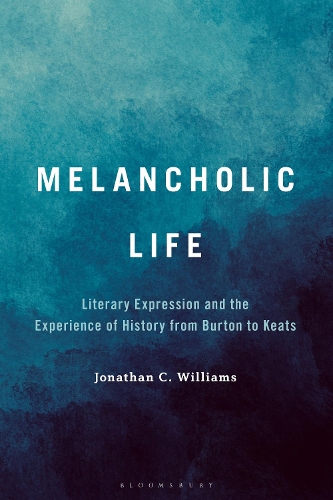
Melancholic Life: Literary Expression and the Experience of History from Burton to Keats
(Hardback)
Publishing Details
Melancholic Life: Literary Expression and the Experience of History from Burton to Keats
By (Author) Dr. or Prof. Jonathan C. Williams
Bloomsbury Publishing USA
Bloomsbury Publishing USA
11th December 2025
United States
Classifications
Professional and Scholarly
Non Fiction
Literary studies: c 1600 to c 1800
Literary studies: fiction, novelists and prose writers
Psychology: emotions
Physical Properties
Hardback
224
Width 152mm, Height 229mm
Description
A study of how 18th-century British literary writers deployed melancholic feeling to draw a complex web of relations between the embodied self and its historical present.
Melancholic Life argues that what binds 18th-century melancholics such as the speaker of James Thomson, Sarah Fieldings David Simple, or William Cowper is a belief that critical thought is worth voicing whether or not it contributes to social change. That belief converges with 18th-century ideas of sentiment and loneliness, but it also syncs up in surprising ways with theoretical models of political subjectivity that emerge in the 20th and 21st centuries.
Jonathan C. Williams thus proposes a new way of thinking about the critical importance of literary melancholy in the 18th century: as the language of melancholic social criticism, a solitary protest against exploitative features of social life, including global commerce and print capitalism. That form of melancholic life helps to trace a genealogy from Robert Burtons Democritus to Defoes Crusoe to the Romantic period; it also yokes the early capitalist historical moment of Mackenzies The Man of Feeling to the post-1968 modernity that characterizes the work of Theodor W. Adorno.
As Melancholic Life shows, melancholic social criticism persists even when there is little hope. That spirit of persistence becomes a condition of literary expression in the 18th century. Attention to melancholic expression reveals resonances not only to medical, religious, poetic, and philosophical language, but also between 18th-century thinkers and your own historical moment.
Author Bio
Jonathan C. Williams is Assistant Professor in the Department of English Language and Literature, Bilkent University, Turkey. His work has appeared in Studies in English Literature 1500-1900, Eighteenth-Century Fiction, Criticism: A Quarterly for Literature and the Arts, and Restoration: Studies in English Literary Culture, 1660-1700, among other publications.
